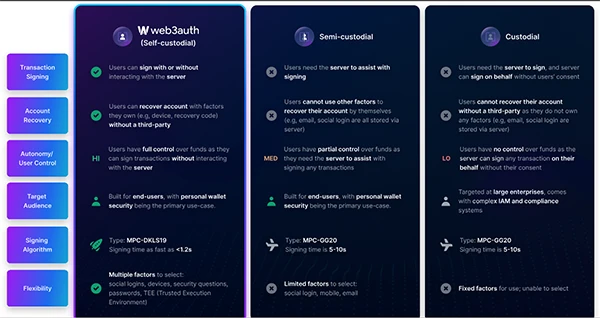Pros and Cons of using MPC Wallets
Ensuring your digital assets are secure is necessary in the constantly changing world of cryptocurrencies.
There is a growing need for strong and innovative security tips for traders and wallet solutions due to the sophistication of cyber threats and hacking efforts. Wallets that support Multi-Party Computation (MPC) have shown promise in resolving these issues.
This article examines the advantages and disadvantages of MPC wallets, highlighting their possible advantages and restrictions.
Pros of MPC Wallets
Enhanced Security
The capacity of MPC wallets to improve the security of your Bitcoin holdings is one of their biggest benefits. Conventional wallets are vulnerable to theft if their private key is compromised.
Nevertheless, these wallets greatly lessen the possibility of a single point of failure by dividing up the task of signing transactions across several parties.
Everybody has a portion of the private key, and any transaction can only be approved by a certain number of people working together. The wallet’s security is considerably harder for attackers to undermine because of this redundancy in the security architecture.
Defense Against Physical Dangers
They improve defense against material risks like theft or harm to paper or hardware wallets. An opponent cannot easily take your assets by obtaining your wallet device because the private key is not stored on a single device.
Because other parties securely store their parts of the key, the wallet’s total security is unaffected even if one party’s device is compromised.

Subtitle: MPC wallet solutions are self-custodial.
Increased Privacy
They can also offer improved privacy. Every transaction in a traditional wallet often necessitates the creation of a new public key, which compromises anonymity because every address is linked to the same wallet.
On the other hand, MPC wallets ensure privacy by allowing the same public key to be used for numerous transactions. This increases the difficulty level for outside observers to track your transactions and associate them with a particular wallet.
Friendly User Interface
Even with their intricate underlying technology, these wallets frequently provide a convenient user experience. The wallet manages several private keys in the background, so users don’t have to.
This lowers the possibility of human error, a frequent security issue associated with cryptocurrencies. They are intended to be as user-friendly as traditional wallets, which increases their accessibility to a wider range of users.
Recuperation and Layoffs
They can offer a practical recovery method for device failure or loss. To prevent their money from being permanently lost, users can safely rebuild their wallets using the shares owned by third parties. Those concerned about hardware malfunctions or device loss may find this redundancy helpful.
DID YOU KNOW?
In 2019, the first 1-round automatic key-refreshing MPC algorithm was debuted as MPC-CMP
Cons of MPC Wallets
Intricacy
The complexity of MPC wallets, both in setup and use, is one of their primary disadvantages. Coordinating with several parties and ensuring that the required shares of the private key are distributed safely are common steps in setting up an MPC wallet.
This process may take time for individuals unfamiliar with cryptography ideas or who would rather manage their cryptocurrency more only.
Dependency on Reliable Sources
They require the assistance of several people, known as trustees, to operate correctly. Because users have to choose and rely on these parties to hold their parts of the private key, this adds a layer of trust to the system. The wallet’s security may be compromised if trustees are shady or uncooperative.
Possibility of Coordinating Difficulties
It might be challenging to coordinate with several people, particularly if they are spread out across different time zones or regions.
For consumers who need immediate access to their cash, delays in getting the required consent from all parties may slow down the transaction execution process, which may not be desirable.
Strict Adoption
In cryptocurrencies, MPCs are a relatively new idea, and their uptake is less extensive than that of standard wallet solutions.
The limited usage of multi-party wallets could lead to incompatibilities with some cryptocurrency platforms and services since not all encourage their use. Integrating them into an already-existing cryptocurrency ecosystem may require more work for users.
Fees and Expenses
Unquestionably, MPCs offer security advantages, but these advantages are frequently costly. The trustees who assist in securing users’ wallets may require fees from users.
These costs can differ dramatically depending on the standing and degree of security the trustees offer. Due to this pricing aspect, some users may be discouraged from using MPC wallets.
In Summary
Wallets that use multi-party computation are a novel approach to cryptocurrency security, providing improved defense against various attacks. They have several benefits, including the capacity to divide private key responsibilities, guard against physical theft, and improve user privacy.
However, some users may need help with the setup’s intricacy and dependence on reliable parties. Also, low adoption and related expenses could put off potential consumers.
Your personal needs and risk tolerance level will determine if these are your best options.
An MPC wallet could be a useful addition to your cryptocurrency security toolset if security is your top priority and you can handle the setup difficulties. But if you’d rather have a more widely accepted and user-friendly option, you may always use traditional wallets or look into other security measures.
MPC wallets will probably get easier to use and more accessible as the cryptocurrency ecosystem develops, making them an even more alluring choice for people looking for the best security possible for their digital assets.
